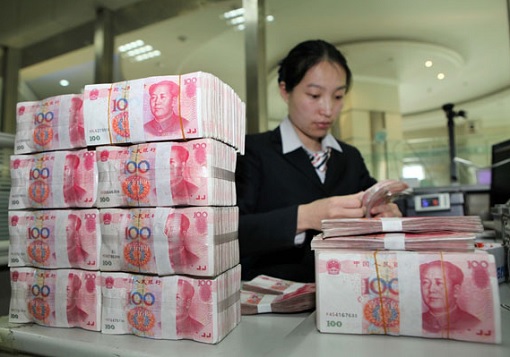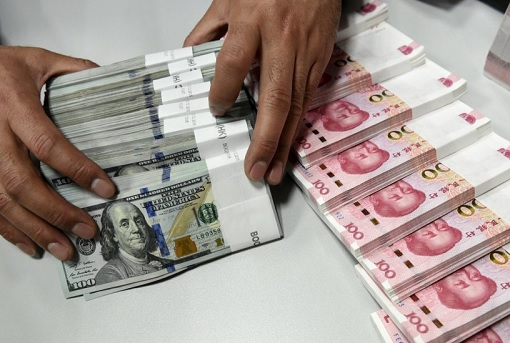One of the reasons why China is awesomely strong has to do with its huge foreign exchange reserves. Armed with the world’s biggest forex reserves, no speculator, including the legendary George Soros, dares to attack the Chinese Yuan / Renminbi. It’s the same reason a jealous President Donald Trump wanted to slap a 45% tariff on Chinese imports.
As money is leaving the kingdom by shiploads, China is heading towards an economic trouble even without America’s punishment. For the first time in almost 6 years, China’s foreign exchange reserves fall below the psychological US$3 trillion level in January 2017. The country’s reserves fell US$12.3 billion in January to US$2.998 trillion.

That’s more than the US$10.5 billion that economists polled by Reuters had expected. What this means is Beijing is fighting a losing battle trying to curb outflows of its currency. In 2016 (last year) alone, the “Middle Kingdom” burned nearly US$320 billion of reserves, on top of a record drop of US$513 billion a year earlier in 2015.
While the world’s second-largest economy still has the largest stash of forex reserves, it has burned through over half a trillion dollars since August 2015, when it suddenly devalued its Yuan / Renminbi. To kill Beijing’s ammunition of foreign reserves, what Washington needs to do is to keep raising interest rate. Speculators will creatively find its way to move money out of China.

In total, the country’s reserves have fallen by US$992 billion from a peak of US$3.99 trillion in June 2014. So far, China hasn’t found a workable solution to its problem despite having implemented tighter regulatory to stop the outflows. The only good news is the capital outflows last month were roughly US$45 billion, ,lower than Dec, 2016’s US$61 billion.
Two things could happen going forward. First, Beijing is expected to fine tune and further tightening its currency liquidity, including tighter approvals for foreign acquisitions, stricter rules on forex purchases by individuals and limits on cross-border Yuan / Renminbi remittance, which enables investors to buy foreign currency in the unregulated offshore market.

Second, Beijing could simply devalue its currency all over again so that it doesn’t need to spend foreign currency to shore up the value of Yuan / Renminbi. The People’s Bank of China has learned the bitter lesson of propping up its currency. At least US$1.2 trillion had left the Chinese soil despite the central bank selling US dollar to support Yuan.
In 2016 (last year) alone, the Yuan depreciated by 6.6% against the US dollar – the biggest yearly drop since 1994 – thanks to Chinese conglomerates snapping U.S. and European companies while wealthy individuals buying foreign real estate. There’s no reason to believe the bleeding is going to stop anytime soon.

China’s foreign exchange regulator, the State Administration of Foreign Exchange (SAFE), said that changes in China’s reserves are normal and the market should not pay too much attention to the US$3 trillion level. However, UBS’ foreign exchange strategist Wayne Gordon predicts China’s foreign exchange reserves will likely fall to US$2.7 to US$2.8 trillion by the end of the year, at least.
Other Articles That May Interest You …
- Trump The Invincible – Dow Hits 20,000 As Stock Market Gains US$2 Trillion Wealth
- No Deal For Bad Deal – 11 Nations Panic As Dealmaker Trump Kills Obama’s TPP
- Goldman Sachs: These Asia Countries Will Be Hit The Most
- Beijing Sends Jack Ma To Befriends Donald Trump, Offering 1-Million Jobs
- China Is Terrified – Trump Has The Power & Ability To Screw Its Economy
- These 8 Men Are As Rich As 3.6-Billion People, Or Half The World
- 10 Business Philosophy Billionaire Trump Disagreed With Billionaire Buffett
- China (Secretly) “Devalues” Yuan – Global Recession Is Calling
- Here’s Why China’s Yuan Devaluation Is Such A Big Deal

|
|
February 7th, 2017 by financetwitter
|


|

|

|

|

|

|




























Comments
Add your comment now.
Leave a Reply